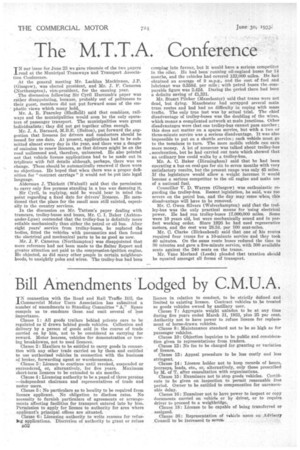The M.T.T A. Conference
Page 102

If you've noticed an error in this article please click here to report it so we can fix it.
IN our issue for June 23 we gave resumes of the two papers read at the Municipal Tramways and Transport Association Conference.
At the general meeting Mr. Lachlan Mackinnon, J.P. (Glasgow), was elected president, and Mr. J. F. Cameron (Northampton), vice-president, for the ensuing year. The discussion following Sir Cyril Hurcomb's paper was rather disappointing, because, probably out of politeness to their guest, members did not put forward some of the emphatic views which many hold. Mr. A. R. Fearnley (Sheffiad) said that combines, railways and the municipalities would soon be the only operators of passenger transport. The municipalities were great individualists; they did not get together often enough. Mr. J. A. Barnard, .M.B.E. (Bolton), put forward the suggestion that licences for drivers and conductors should be issued for one date. At present, applications had to be submitted almost every day in the year, and there was a danger of omission to renew licences, so that drivers might be on the road unlicensed and, therefore, uninsured. He also pointed out that vehicle licence applications had to be made out in triplicate with full details although, perhaps, there was no change. These should be automatically renewed if there were no objections. He hoped that when there was a proper definition for "contract carriage" it would not be put into legal language.
Alderman T. Thickett (Walsall) said that the permission to carry only five persons standing in a bus was damning it.
Sir Cyril, in replying, said he would bear in mind the point regarding a fixed date for drivers' licences. Be mentioned that the place for the small man still existed, especially in the country services.
In the discussion on Mr. Tattam's paper dealing with tramcars, trolley-buses and buses, Mr. C. I. Baker (Ashtonunder-Lyne) contended that the trolley-bus is definitely more reliable mechanically than either the petrol or oil bus. After eight years' service from trolley-buses, he replaced the bodies, fitted the vehicles with pneumatics and then found the electrical and mechanical parts to be as good as new.
Mx. J. F. Cameron (Northampton) was disapPointed that more reference had not been made to the Salter Report and greater attention not paid to the compression-ignition engine. He objected, as did many other people in certain neighbourhoods, to unsightly poles and wires. The trolley-bus had been creeping into favour, but it would have a serious competitor in the oiler. He had been running oil-engined buses for 14 months, and the vehicles had covered 132,000 miles. He had obtained an average of 9 m.p.g., and the cost of fuel and lubricant was 0.558d, per mile ; with petrol buses the .comparable figure was 2.42d. During the period there had been a definite saving of £1,331.
Mr. Stuart Filcher (Manchester) said that trams were not dead, but dying. Manchester had scrapped several main tram routes and had had no difficulty in coping with mass traffic. The only true test was by actual trial. The chief disadvantage of trolley-buses was the doubling of the wires, which means a complicated network at main junctions. Other disadvantages were that one trolley-bus cannot pass another ; this does not matter on a sparse service, but with a two or three-minute service was a serious disadvantage. It was also impossible to put on a shuttle Service; each vehicle must go to the terminus to turn. The more mobile vehicle can earn more money. A lot of nonsense was talked about trolley-bus . acceleration, but he had carried out tests which showed that an ordinary bus could waltz by a trolley-bus, Mr. A. C. Baker (Birmingham) said that be had been operating a bus on coal-gas for six to seven months with very satisfactory results, but the present range was only 45 miles. If the legislature would allow a weight increase it would become a serious competitor to the oil engine and make use of a national fuel.
Councillor V. D. Warren (Glasgow) was enthusiastic regarding the trolley-bus. Recent legislation, he said, was too severe on the petrol bus, and the day may come when, this disadvantage will have to be removed.
Mr. C. Owen Silvers (Wolverhampton) said that the trolley-bus was the only practical means for using electrical power. He had run trolley-buses 17,000,000 miles. Some were 10 years old, but were mechanically sound and in perfect working order. Since 1926 he had used regenerative motors, and the cost was 28.3d, per 100 seat-miles.
Mr. C. Clarke (Birkenhead) said that one of his routes required four trams for a 10-minute service and they took 40 minutes. On the same route buses reduced the time to 30 minutes and gave a five-minute service, with 300 available seats against the 240 seats on the trams.
Mr. Vane Morland (Leeds) pleaded that taxation should be equated amongst all forms of transport.




















































































































































